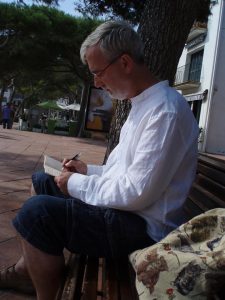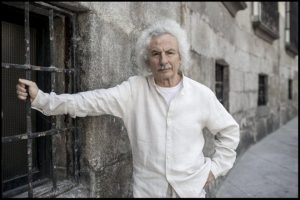The Spanish actor travels through the Iberian territory while representing the different works that he has in his repertoire, and this year he has landed with two of them in Barcelona, with “Lazarillo de Tormes” and “Autobiografía de un yogi”, in a rather peculiar setting: the Teatro Apolo on the Catalan avenue Paral·lel.
By Jordi Mat Amorós i Navarro
Posted on 19.11.2022
«The scene is as big as the brightness of the stars and there is another life to be dreamed of, to which you can wake up. The world is in the soul. It is your worldview that creates the world; therefore there is no transformation of the world if it does not begin with your own transformation».
rafael alvarez in The Wizard
SAlthough he has worked in film and television, it is in the theater where Rafael Álvarez, this great Andalusian actor and playwright, has achieved greater recognition thanks to his excellent monologues around great works such as Don Quixote, the miser, The odyssey either lazarillo de tormes.
There they are to attest to its numerous awards, among which the Pepe Isbert National Theater Prize awarded by the Association of Friends of the Theaters of Spain and the Gold Medal for Merit in Fine Arts awarded by the Spanish Ministry of Culture stand out.
And it is that El Brujo embodies the spirit of the Spanish minstrel like no other, he is a minstrel from head to toe, a minstrel whose center of gravity is in the heart. A true master of stage art who intensely lives the characters he plays, seeking in them the humanity that defines them, and in that heartfelt humanity he manages to connect with the public, awakening hearts and consciences.
His art is liberation thanks to good humor, a humor that has respect as its flag. Between laughter and laughter that is liberating in itself, he transmits a message that emanates from ancestral wisdom. Transcendental and transcendent humanities belonging to different times and cultures speak to us through his mouth, humanities that are intertwined in the committed verb of El Brujo.
Especially significant are the voices of the Spanish mysticism of Teresa de Jesús and Juan de Yepes and also of the yogic spirituality of Paramahansa Yogananda, his reference teacher together with Jesús de Nazaret.
Asceticism in Paral·lel
El Brujo performs throughout the Spanish territory simultaneously representing different works that it has on offer, and this year it has landed with two of them in Barcelona in a very peculiar setting that has nothing to do with the venues where it had previously performed.
It is surprising to see it in the Teatro Apolo, located on the famous Paral·lel avenue, which during the Franco regime became an oasis of freedom by hosting cabaret theaters and vaudeville shows that in their mischievous impudence defied the censorship of the prevailing national Catholicism.
At the Apolo, which in that dark time was the home of the star Tania Doris, works —often musicals— are currently exhibited, mainly for the general public, in which the scenographic and artistic display is usually exuberant.
In this way, between performances of mega productions a great has “slipped” who is so because of his essential minimalism, a great who acts alone and with little scenery. An ascetic in Para·lel offering us two key works of his long career: lazarillo de tormes Y Autobiography of a yogi.
Of the physical and material shelter
lazarillo de tormes is a 16th century novel by an unknown author that is considered one of the great classics of Spanish literature. In 1991 El Brujo premiered as Lazarillo in the version made by the great Fernando Fernán Gómez, who also directed him —together with José Luis García Sánchez— in his film adaptation.
From then until now the work has been represented on numerous occasions throughout Spain because, as the master minstrel confesses to us, he will never abandon Lazarillo.
This is a jewel of literature, whose message is still valid. In the words of El Brujo: «This entity from the imaginary world could change the real world because it makes art out of hunger and need, it recycles it into wisdom. Faced with pain we have two paths: complaint or art. And ironically, part of the state of the fool, walk through learning and reach wisdom. The Lazarillo de Tormes it deals with marginalization, hunger and the harsh experience of childhood. The parallels between the world of the infant accompanying the blind and the situation of so many third world children dying of starvation are obvious. History repeats itself over and over again”.
So in that I will never abandon Lazarillo —I understand— he is telling us that he will never abandon his commitment to people who suffer and especially to children who cannot have food and the necessary conditions to grow. The sorcerer is aware of the reality of our world that unfortunately has not changed that much since the times portrayed in this classic work.
The mother who gives her child to a blind man who mistreats him and when Lazarillo manages to escape from such a character ends up with a clergyman who, although he physically observes, is as blind with selfishness as his previous “mentor”. The blindness of selfishness as the worst face of the human condition, the blindness of selfishness that kills lives and kills souls.
And by virtue of portraying that hardness, that inhumanity, through the light of humor, El Brujo acts as a mirror in which we can see our society and ourselves. When we laugh at those unfortunates —unfortunates, yes, it is impossible to be happy without giving ourselves a lot of material to treasure— egoists will easily come to mind similar characters from our inner circle and from the society to which we belong, and perhaps —hopefully— we will be able to see to what extent —to a greater or lesser extent— we may be acting selfishly.
Of the psychic and spiritual shelter
Covered the basic needs of living that portrays as a complaint The Lazarillo de Tormes needs that are as or more important for every human being can be met. Beyond food and physical protection, we need to feed our soul, give ourselves and give psychic and spiritual shelter.
The Witcher tells us about this necessary food in autobiography of a yogi. He speaks to us from his personal experience after discovering this extraordinary book by the teacher Paramahansa Yogananda, one of the introducers of Yoga in the West.
A text on the spiritual science of Yoga that goes far beyond postural Yoga in which many Westerners confine this holistic discipline that supposes a way of understanding and living radically different from the dominant one in our world of exaltation of the material.
It is therefore a risky bet, it is not easy to get the involvement of the public in a work as deep as this.
This is how the Andalusian master expresses it in his introduction, appealing beautifully to the flight of being:
«In all my shows laughter is a dominant factor… and even so I always look for a moment where the breath rises towards the sacred domain of poetry. Shakespeare was also a comedian but also a poet. That’s why I invoke his spirit to give wings to my laughter and make it more transparent. This time I will need it in a very special way. I am afraid that you will also have to make a special effort to accompany me, could I fly without you?
And he has succeeded, he has managed to fly, autobiography of a yogi It has been represented on numerous occasions since its premiere in 2017, obtaining a great reception from both the public and critics.
There are two hours of performance in which El Brujo captures his spiritual experience and seeks to convey the essence of yogic philosophy, of the truth that is found in each one of us and that requires calming the mind to be discovered.
In this sense, he emphasizes the need not to be carried away by fear in these uncertain times, that fear that many powers encourage and that seeks to align us with their worrying messages, that fear that generates darkness in the world, a darkness that interests those who they “live” on it with zero empathy.
Personally, this is the work that has made me fly the most —with laughter and my soul— of the many —unfortunately not all of them— by this blessed minstrel that I have had the satisfaction of experiencing. His usual mastery of moving from the deepest to the comic takes on a sublime dimension in her. And how he himself repeats in the work, when enjoying it one really feels that liberating “I’m fine”.
And his latest show —which I hope to see soon— with the title The gods and God which is announced as: “a deep spiritual reflection on the relationships between divinities and humans that draws on the Homeric tradition.”
A work that from Host de Plauto delves into the mythology of all times and cultures from the hand of the great researcher Joseph Campbell and his top text The hero with a thousand faces.
watch it
If you have never seen this sublime minstrel and live or travel to Spain, don’t miss it, he often performs in Madrid at the Alcázar Theater. And he is a regular at the prestigious Mérida Classic Theater Festival that is held every summer within the framework of the wonderful Roman Theater of the city of Extremadura, in that space that resonates with history, he usually premieres his works.
In any case, you can enjoy the videos that he made during the pandemic and that are available on his website, through the following link.
Divine words, divine minstrel.
*To Paco, Loli, Ester, Serafín and so many companions on an interior journey that we have met at the Namaste Yoga Center in Cornellà de Llobregat.
***
Jordi Mat Amorós i Navarro He is an educational therapist graduated from the University of Barcelona, Spain, as well as a dowser, poet, and permanent editor of the Diario Cinema and Literature.
Rafael Alvarez “The Witcher”

Jordi Mat Amorós i Navarro
Outstanding image: Rafael Alvarez “El Brujo”.
[Ensayo] Rafael Álvarez “El Brujo”: The mastery of a yogic minstrel – Cinema and Literature

